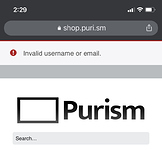Well, I’m not sure that is exactly the point, and I do know the difference, but Privacy and Anonymity are very closely linked. When either one is compromised, the other may be by default, or at least it is easier for it to be. And both are linked to Security, and to Identity. (P.A.S.I. ?)
I do realize these are not interchangeable terms, but all four are important terms, and interrelated in a way that confusing them can cause one to fudge and trip while trying to practice or explain them.
I mean, Purism does not use its particular laptop password technology merely to keep people from “knowing what you are doing,” but to respect your wish for anonymity, so your identity is not detected, and the knowledge thereof not used to hack through the security… on your laptop… and find out what you are doing. Whoops.
You are probably paraphrasing the terms’ meanings, but the answer does not address the question.
So now I’m even more concerned. A company focusing on privacy is (to follow your thinking) not following best password practices, but fails to do so because it is getting oddly technical in the use of the word ‘privacy’ to the extent that they disregard related best practices of anonymity, security and identify protection. “We are privacy focused, why are you asking us about anonymity?” (I do not actually think they believe this, but perhaps you would like to convince me otherwise lol.)
And though the error message might not make sense to some, it is not ambiguous in the least, nor does understanding it in the way I am describing infer that the understander-er is less than honest. Ask a CEH.
Purism is not disallowing access to your account for purely philosophical or ethical reasons of privacy, I assure you.
Oh dear, I’ve opened a can of worms.
I think this is an important question – specifically, Purism’s error message – and I hope it is addressed.
Maybe just fix it first (wouldn’t do any harm) and then study the risk (might do some good, or some bad by not) and change their lockout system if warranted.
Come to think of it, if an attempt to log into a Puri.sm account fails, or a password is changed, is the account owner alerted? (Would someone please help me catch those two worms?)
— Privacy, yay.

